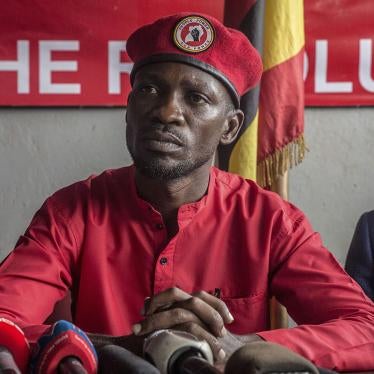Dear Minister,
We write to urge you to use your seat on the UN Security Council to authorize without delay the deployment of a strong UN peacekeeping mission, as envisioned in the report UN Secretary-General Ban Ki-moon submitted on March 3, to protect civilians under attack in the Central African Republic (CAR).
Despite an increase in international attention to this crisis, the UN Secretary-General found a “grave deterioration of the human rights situation” in the country. The deployment of close to 6,000 African Union troops and 2,000 French troops is, according to the UN, “not sufficient, and lacks the civilian component to adequately protect civilians.”
Our research supports UN findings. Over the last few months, as Seleka militia retreated to the North-East, committing a last spate of violence against civilians, anti-balaka launched a relentless wave of attacks, sometimes calling them, according to the UN report, “cleansing operations,” which targeted the country’s Muslim minority.
French and AU forces have not been able to stem the flight of entire Muslim communities to neighboring countries. In Bangui, according to the UN, only 900 of 140,000 Muslims remain, and those left behind fear for their lives. In the northwestern towns of Baoro, Boali, and Yaloke, as well as others, once home to thousands of Muslims, the last Muslim residents have fled, and dozens of mosques have been destroyed by anti-balaka, as witnessed by our researchers. Those remaining, in towns like Boda, include many who were simply too weak or infirm to flee.
According to the UN, the anti-balaka are “becoming increasingly organized in Bangui and other parts of the country and have access to firearms and heavy weapons.” Anti-balaka militia continue to pose an imminent threat to CAR’s remaining Muslims, as well as to other civilians. Seleka forces have retreated to the north with most of their weapons and equipment and will continue to pose a serious threat to civilians unless disarmed.
The human rights crisis plaguing the country since the Seleka took over power in March 2013 is compounded by a complete impunity for serious human rights abuses, including scores of killings, rapes, looting, and the destruction of entire villages. The country has experienced, according to the UN report, a “total breakdown of law and order,” with a collapsed justice system, wrecked correctional facilities, and security forces unable to function. Even the most blatant crimes have gone unpunished. Our organizations are, for example, unaware of any arrest made following the brutal lynching of a man at the end of the February 5th ceremony marking the return of the national army, even though dozens of soldiers and international journalists witnessed, and in some cases filmed, the event.
We believe that the deployment of 10,000 UN peacekeepers and 1,820 police, as recommended by the UN Secretary-General, would go a long way toward keeping armed groups in check, pulling the country back from the brink of anarchy, and allowing tens of thousands of civilians to go back to their homes and start rebuilding their lives.
Only a strong UN peacekeeping mission will have the resources and the civilian expertise to improve the protection of civilians, create conditions conducive to the delivery of desperately needed humanitarian aid, help reestablish the basic functions of the rule of law in the country, create the conditions for a safe and voluntary return of displaced people, monitor and report publically on human rights violations, and disarm and reintegrate armed elements.
At a time of global financial constraints, we realize that the proposed peacekeeping mission will come at a price for taxpayers. But we are convinced that inaction would come at a greater price, both for the international community and for the people under threat in the country, for whom the UN is the only true source of help.
Sincerely,
Amnesty International
Central African League for Human Rights (LCDH)
Central African Observatory for Human Rights (OCDH)
Enough Project
Global Centre for the Responsibility to Protect
Human Rights Watch
Humanity United
International Federation for Human Rights (FIDH)
Invisible Children






